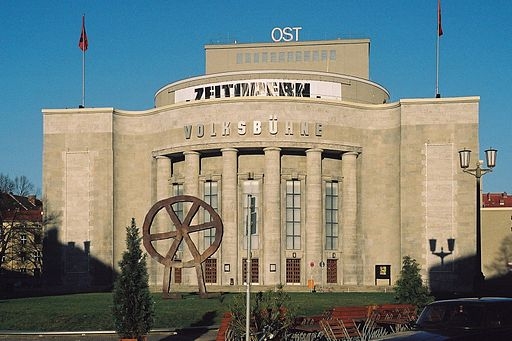In a recent profile piece in the Süddeutsche Zeitung, international art star, art activist and current resident of Berlin Ai Weiwei is found criticising the ‘mental sluggishness’ of the German cultural scene while having a go at what he describes as the ‘Leftist Establishment’. The object of Ai’s annoyance? Berlin’s Volksbühne theatre, where his ‘old friend’ former Tate Modern director Chris Dercon has been appointed artistic director, set to take over in 2017. And why? Well, back in June, employees and supporters of the Volksbühne (or ‘People’s Theatre’) had penned an open letter to the Berlin Senate protesting Dercon’s appointment. This followed the first presentation of his vision for the theatre, one known for its historically avant-garde and politicised approach, particularly under its current artistic director, the intransigent and often controversial Frank Castorf.
In their letter, the signatories warn against the dissolution of the Volksbühne’s core artistic commitment to theatre as an artform. While it could uncharitably be seen as a defensive attempt by its employees to keep things just as they are, resisting the bracing winds of contemporary cultural change, the Volksbühne’s open letter pinpoints a shift in artistic culture that is reflected by the appointment of a figure such as Dercon. As the letter argues, ‘This change represents a historical levelling and razing of identity.’ Why? Because the ‘artistic processing of social conflict is displaced in favour of a globally extended consensus culture with uniform presentation and sales patterns’.
For the Volksbühne’s supporters, an artistic institution has a commitment to both an artistic tradition and artform – in this case theatre – and the culture and society in which it operates. But commitment to any single artform or artistic genre is something that is becoming increasingly unfashionable among contemporary cultural institutions, particularly in the public institutions of contemporary art, where, as with Dercon’s former employer Tate Modern, the genre boundaries are being constantly absorbed and dissolved – live music, performance, contemporary dance, film and, yes, theatre all finding their way into the programmes.
But what is missing in this assimilation is exactly the commitment to continuity that an artform-specific institution such as the Volksbühne represents. And one marked tendency of global contemporary art programmes in big institutions is that their commitment to different genres is temporary and passing, often appropriated by contemporary artists who borrow particular artforms while not being part of the artistic and institutional communities and economies that maintain them – artists ‘doing’ opera, for example. It is this fragmentation of artistic commitments, and the emergence of a new form of casualised, temporary programming – driven principally by the global success of the format of the contemporary art museum (as led by figures such as Dercon) – of which the Volksbühne’s supporters are rightly afraid.
In their open letter the art-managers reveal the staggering level of arrogance, self-regard and entitlement that comes with being a member of the small clique of privileged art-institution power-brokers
Such resistance is futile, however, to the new class of global art-culture managers; in an open letter in response to the Volksbühne, a fearsome array of the global artworld’s senior management, including curators Okwui Enwezor, Hans Ulrich Obrist, Carolyn Christov-Bakargiev, Adam Szymczyk and Christine Macel, art museum architects Jacques Herzog and David Chipperfield, designer Peter Saville and others, all laid into the Volksbühne’s supporters, in terms dripping with outraged contempt for those who might upset the smooth professional functioning and circulation of high-level cultural appointments. Accusing the opponents of Dercon’s appointment of attempting ‘a narrow-minded and self-interested coup d’etat’, it warns the City of Berlin for failing ‘to defend the professional basis upon which Mr. Dercon was appointed’. Berlin, scolds the letter, ‘will also relinquish all claims to being an open city, a cosmopolitan place where professionals can accept an appointment in good faith with the freedom to think adventurously and create beyond the conventional bounds of institutional structures’.
In other words, we will not tolerate your interference if you dare get in the way of us ‘professionals’, as we bulldoze our model of the temporary, casualised, consumer-oriented, genre-indifferent, globalised contemporary art programme over your local, artform-specific, socially embedded cultural institution, or upset our smoothly-private employment negotiations with all your silly quibbling.
Yet for all its shrill invective about a ‘miscarriage of justice’ and its characterisation of the Volksbühne’s open letter as ‘about power, and the abuse of the privilege conferred by public employment to defeat an individual’s vision’, in their open letter the art-managers reveal the staggering level of arrogance, self-regard and entitlement that comes with being a member of the small clique of privileged art-institution power-brokers. In their most risible moment of preening self-mythologising, the curators declare that ‘to bring excellence and vitality to culture we must constantly dare to appoint new stewards of institutions, who are charged to challenge and reimagine their place in our cultural, political, and moral reality’. The idea that such ‘visionary individuals’ should ever be challenged by a local artistic community, or that their artistic vision should ever be publicly questioned as part of their appointment, only serves to remind us of how opaque and unaccountable the circuits of art-power are today, and how fearful they are of public criticism. Faced with such an unsavoury display of global art privilege, one can only declare: ‘Power to the Volk!’… Or at least to the Volksbühne.
This article is from the forthcoming October 2016 issue of ArtReview.
